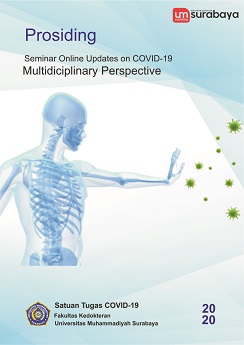Tata Laksana Apendisitis Akut di Era Pandemi Covid-19
Abstrak
AbstractAppendicitis is an inflammation of the appendix vermiformis caused by a blockage in the form
of fecalit or infection and is the cause of most cases of acute abdomen that occur. Acute
abdomen requires emergency action, many cases of appendicitis in Indonesia require fast and
precise action to prevent perforation. The diagnosis of acute appendicitis is based on history,
physical examination, and supporting examinations such as ultrasound examination (USG).
Management of appendicitis can be operative and non-operative. Conservative management
of antibiotics in uncomplicated appendicitis will have a risk of recurrent appendicitis ranging
from 16-40% of initial treatment within one year. However, if the patient's condition worsens
or treatment with antibiotics is unsuccessful, an appendectomy is performed either by open
surgery or by laparoscopy. Acute abdominal pain in Covid-19 patients poses a dilemma for
doctors, delaying surgical management can lead to serious complications and even death. Vice
versa, performing unnecessary surgery on Covid-19 patients causes iatrogenic morbidity and
death. Therefore, the surgeon is obliged to adhere to the protocol established by the Indonesian
General Surgeons Society.
Keywords: appendicitis, pandemi, COVID-19
Referensi
Fransisca C, Gotra IM, Mahastuti NM. Karakteristik Pasien dengan Gambaran Histopatologi
Apendisitis di RSUP Sanglah Denpasar Tahun 2015-2017. Jurnal Medika Udayana.2019
Siswandi A. Grambaran Klinis Pasien Appendisitis Akut Dengan Menggunakan Tzankis Skor
dan Alvarado Skor di RSUD DR H Abdul Moeloek Bandar Lampung Tahun 2014. Jurnal Medika
Malahayati. 2015
Li Q, Guan X, et al. Early Transmission Dynamic in Wuhan, China, of Novel Coronavirus
Infected Pneumonia. The N Engl J Med. 2020.
World Health Organization. WHO Coronavirus (COVID-19) Disease Dashboard. WHO; 2020.
Available from :https://covid19.who.int/region/searo/country/id
Susilo A, et al. Coronavirus Disease 2019 : Tinjauan Literatur Terkini. Jurnal Penyakit Dalam
Indonesia. 2020.
Warsinggih. Bahan Ajar Apendisitis Akut. Nusantara Medical Science.2010. [diakses: 11
Oktober 2020]. Tersedia: https://med.unhas.ac.id/kedokteran/wp-content/
uploads/2016/10/Appendisitis-akut.pdf
Petroianu A. Diagnosis of acute appendicitis. International Journal of Surgery. 2012
Kabir SA et al. How to Diagnose an Acutely Inflamed Appendix: The latest Evidence.
International Journal of Surgery.2017
Shogilev DJ et al., Diagnosing Appendicitis: Evidence-Based Review of the Diagnostic
Approach in 2014, West. J Emerg Med. 2014
C.W. Yu, L.I. Juan, M.H. Wu, C.J. Shen, J.Y. Wu, C.C. Lee, Systematic review and metaanalysis of the diagnostic accuracy of procalcitonin, C-reactive protein and white blood cell count
for suspected acute appendicitis, Br. J. Surg. 2013
Al-Gaithy ZK. Clinical value of total white blood cells and neutrophil counts in patients with
suspected appendicitis: retrospective study, World. J Emerg Surg. 2012155 | H a l a m a n
S. Xharra, L. Gashi-Luci, K. Xharra, et al., Correlation of serum C-reactive protein, white blood
count and neutrophil percentage with histopathology findings in acute appendicitis, World. J
Emerg Surg. 2012
J.T. Muenzer, D.M. Jaffe, S.J. Schwulst, et al., Evidence for a novel blood RNA diagnostic for
pediatric appendicitis: the riboleukogram. Pediatr Emerg Care. 2010
M. Hernanz-Schulman. CT and US in the diagnosis of appendicitis: an argument for CT.
Radiology. 2010
K. Kim Y.H. Kim S.Y. Kim et al., Low-dose abdominal CT for evaluating suspected
appendicitis. N Engl J Med. 2012
R. Krishnamoorthi, N. Ramarajan, N.E. Wang, B. Newman, E. Rubesova,C.M. Mueller, R.A.
Barth. Effectiveness of a staged US and CT protocol for the diagnosis of pediatric appendicitis:
reducing radiation exposure in the age of ALARA. Radiology. 2011
Baresti SW, Rahmanto T. Sistem Skoring Baru untuk Mendiagnosis Apendisitis Akut. Majority
Journal. 2017
Vons C, Barry C, Maitre S, et al. Amoxicillin plus clavulanic acid versus appendicectomy for
treatment of acute uncomplicated appendicitis: an open-label, non-inferiority, randomised
controlled trial. Lancet. 2011
Salminen P, Paajanen H, Rautio T, et al. Antibiotic therapy vs appendectomy for treatment of
uncomplicated acute appendicitis: the APPAC randomized clinical trial. JAMA. 2015
Bhangu A, Søreide K, Di Saverio S, Assarsson JH, Drake FT. Acute appendicitis: modern
understanding of pathogenesis, diagnosis, and management. Lancet. 2015
Ma KW, Chia NH, Yeung HW, Cheung MT. If not appendicitis, then what else can it be? A
retrospective review of 1492 appendectomies. Hong Kong Med J. 2010
Shindoh J, Niwa H, Kawai K, Ohata K, Ishihara Y, Takabayashi N, Kobayashi R, Hiramatsu T.
Predictive factors for negative outcomes in initial non-operative management of suspected
appendicitis. J Gastrointest Surg. 2010
Markar SR, Penna M, Harris A. Laparoscopic approach to appendectomy reduces the incidence
of short- and long-term post-operative bowel obstruction: systematic review and pooled analysis.
J Gastrointest Surg. 2014
United Kingdom National Surgical Research Collaborative Bhangu A: Safety of short, inhospital delays before surgery for acute appendicitis: multicentre cohort study, systematic review,
and meta-analysis. Ann Sur. 2014
Persatuan Ahli Bedah Umum Indonesia. Pandun Pelayanan Bedah Umum Menghadapi Pandemi
Covid-19 di Indonesia. PABI: Jakarta, 2020
Suwanwongse K, Shabarek N (July 25, 2020) Pseudo-Appendicitis in an Adolescent With
COVID-19 . Cureus 12(7): e9394. DOI 10.7759/cureus.9394
Saeed U, Sellevoll HB, Young VS, Sandbaek G, Glomsaker T, Mala T: Covid-19 may present
with acute abdominal pain. Br J Surg. 2020, 107:186-187. 10.1002/bjs.11674
Benjamin Wolf, Corinna Pietsch, Marc-Philip Radosa, Lars-Christian Horn, Uwe G. Liebert
Bahriye Aktas: No SARS-CoV-2 detected in the vermiform appendix of a COVID-19 patient
with appendicitis: a case report. 2020. : https://doi.org/10.21203/rs.3.rs-38187/v1
Javier Romero, MD, MSc, Sergio Valencia, MD, MSc, Andres Guerrero, MD: Acute
Appendicitis During Coronavirus Disease 2019 (COVID-19): Changes in Clinical Presentation
and CT Findings. J Am Coll Radiol 2020;17:1011-1013






